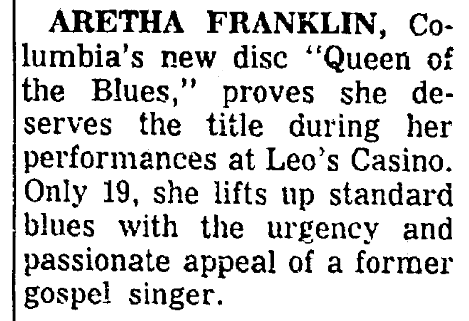Introduction: In this article, Gena Philibert-Ortega searches old newspapers to learn more about the amazing life of Aretha Franklin, the Queen of Soul. Gena is a genealogist and author of the book “From the Family Kitchen.”
When the river was deep I didn’t falter
When the mountain was high I still believed
When the valley was low it didn’t stop me, no no–“I Knew You Were Waiting for Me,” sung by Aretha Franklin and George Michael

The recent death of Aretha Franklin (1942-2018) has caused a nation – and the whole world – to reflect on the legacy of the Queen of Soul. In a career that spanned five decades it is difficult to choose just a few stand-out songs, but the most well-known include her version of the Otis Redding song-turned-anthem “RESPECT” and her screen performance of the song “Think,” sung to a fictional husband bent on hitting the road with the band in the 1980 movie The Blues Brothers.
But Aretha Franklin was much more than those two memorable songs. She had a long and varied career that transcended several musical genres.
Queen of Soul and More
Yes, she was the Queen of Soul – but in reality, Aretha was the queen of more than that one musical style. Her gospel roots started her musical career; her father was a minister, and that background could be heard in her voice every time she sang. Before she was the Queen of Soul she was the Queen of the Blues. This 1963 newspaper article crowns the then 19-year-old as the Queen of the Blues who “lifts up standard blues with the urgency and passionate appeal of a former gospel singer.”

She went on to make a record that honored an earlier Queen of the Blues, Dinah Washington. That album, Unforgettable: A Tribute to Dinah Washington, released on 18 February 1964 just two months after Washington’s death, honored a woman that like Aretha sang a variety of musical styles including jazz, blues, and pop.
Aretha’s singing was impressive because she was so multi-talented as a vocalist. Her vocal range spanned three to four octaves. Her early career found her not only singing the blues but also singing jazz. Her first album for Columbia (1961), Aretha: With the Ray Bryant Combo, showcased her singing jazz and pop songs with the jazz pianist and composer Ray Bryant. Songs on that album include “Who Needs You,” which was co-written by the great jazz singer Billie Holliday. Aretha was a supporter of the Thelonious Monk Institute of Jazz and performed at the International Jazz Day event at the White House.
Later she would conquer R & B, Pop music, and of course, Rock and Roll. In fact, she was the first woman inducted into the Rock and Roll Hall of Fame, in 1987. Aretha was the consummate performer who, no matter what musical genre she was performing, could bring an audience to their feet.
This was demonstrated when she filled in for opera singer Luciano Pavarotti at the 1998 Grammy awards by singing the aria “Nessun dorma.” Two hours before he was scheduled to perform, Pavarotti called in that he was unable to sing. Aretha stepped in and delivered an amazing performance that you can watch on YouTube and read about on the Billboard website.
A Queen for All
Aretha Franklin’s life’s work included 88 albums and 73 entries on the Billboard Top 100 including her first hit in 1961, “Won’t Be Long,” to her final hit in 1998, “A Rose Is Still a Rose.” She sang for presidents, a queen, a pope, the famous, and the common men and women. She sang for them all. She received numerous awards honoring her musical talent including the Grammy Legend Award (1991), the Grammy Lifetime Achievement Award (1994), Kennedy Center Honoree (1994), and the Presidential Medal of Freedom (2005).*
Aretha’s life is a story that cannot be told adequately in a short article. It’s one that unfolds thanks to her music, work, memories, recordings, articles and books written about her.
____________________
* “Aretha Franklin,” Wikipedia (https://en.wikipedia.org/wiki/Aretha_Franklin: accessed 20 August 2018).
